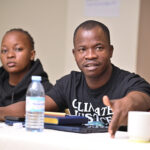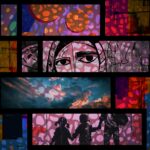This article was published more than 6 years ago.
I recently embarked on my first official visit to the Democratic Republic of Congo (DRC) as a consultant for the Fund for Global Human Rights. During my trip, I met with representatives from a dozen local civil society organizations the Fund supports. Today, the stories I heard are still with me—and I’m still pondering how to deliver the “deeper engagement” with human rights activists that the Fund promises our grantees.
The activists I met are doing incredible work in DRC’s eastern provinces, where ongoing conflict has reportedly claimed over five million lives since 1997. As I visited area communities, I heard countless stories of suffering caused by the armed violence, rampant corruption, extreme poverty, and under-development that plague the region.
For far too long, Congolese citizens have been forced to walk a tightrope between leaving or staying, bribing or abstaining, silencing themselves or shouting, dying or living. As a Burundian living within sight of eastern DRC, I have watched the human rights crisis unfold and deepen. Still, a border always operates as a buffer between perceptions and realities. I always wondered if there was more to DRC than darkness, and during my visit I realized that if I am to offer a deeper level of engagement to groups working there, I must start by taking a closer look at this vast and resource-rich country. Fortunately, I had Murhabazi Namegabe, director of the children’s rights group BVES (Office of Voluntary Service for Children and Health), to guide me.

A glimpse into the rehabilitation of child soldiers
A Fund grantee since 2005, BVES works on a range of children’s rights issues, including ending the use of child soldiers. They help prevent the recruitment of children into armed forces by teaching communities about children’s rights and how to protect their youth, while advocating with armed groups to stop the practice. They also negotiate with armed leaders to secure the release of children who have already been conscripted, and provide psychosocial support, education, and shelter to rehabilitate former child soldiers so they can reintegrate into society.
Needless to say, I was eager to meet the activists behind this difficult—and often dangerous—work. When I reached BVES’s office, I found Murhabazi gathered around a large table with 10 of his colleagues, mainly psychosocial care workers. The stern and battered look of the room and the impetuous tone of Murhabazi’s voice made it feel more like a meeting between a military commander and his troops than a grantee site visit.
“Many underaged girls are sexually enslaved by armed groups,” Murahabazi said, bluntly. “As soon as they arrive in a military unit or a rebel camp, they are ordered to lay themselves bare and naked as a means to make them lose all sense of intimacy and decency over time. After weeks, when they have turned ‘raw’ and ‘combatants’ feel sexually satisfied, the girls are dispatched to another unit.”
My mind was still processing this reality when Murhabazi drove me to a shelter where girls who have survived various forms of abuse, including sexual slavery, live. When we arrived, the girls were in class—part of BVES’s efforts to help them catch up on the years of schooling they lost during their captivity. Upon Murhabazi’s suggestion, I walked with him into a classroom. As the students struck up a welcome song, I saw two underaged girls sitting on a bench at the back—the same cool, detached gaze on their faces. They had not sung with the other girls, and looked me so straight in the eyes that I had to look away. At that moment, I could not help but remember Murhabazi’s words about survivors’ senses of decency and intimacy being damaged by their abusers.

Confronting warlords
I likely came face-to-face with some of these abusers at an unprecedented, BVES-convened, Fund-supported children’s rights workshop that brought together 40 armed group leaders from three provinces. Getting these combatants to leave the cover of the bush and expose themselves in a city like Bukavu was a tall order—but if anyone could make it happen, it was Murhabazi, who has spent years patiently building inroads into their worlds. It was surreal to see these elusive stakeholders in one room, listening to BVES staff harass their consciences with indictments of the abuses their troops have committed. The impact of the convening remains to be seen, but there is no doubt Murhabazi will be monitoring it closely.
Ironically, BVES’s “reward” for its efforts is often a heavier workload. On my last night in the DRC, I was in my hotel room preparing for bed when around 10:30 PM, the telephone rang. It was Murhabazi, who probably had no idea what time it was. He invited me for a drink at a nearby restaurant. He looked washed out when I met him; but, somehow, his emphatic voice had survived the backbreaking tasks of the day.
I was doing a great job at keeping the conversation light—my way of trying to get his mind off things, I suppose. But Murhabazi sabotaged my efforts when he casually stated, “By the way, I have sent our truck to Bunyakiri in Kalehe (South Kivu) to recover 40 children, including 17 girls released by Mai Mai militia groups. Now they are safe in our shelters.”

The militia groups had delivered on their recent promise to release children in their ranks. It was a victory indeed, and Murhabazi was, of course, relieved; but for his organization, a new set of stressors were arising in the form of having to feed, clothe, and support these children.
By raising crops and livestock in Kabare territory 25 miles away from Bukavu, BVES is able to feed the sizeable number of children under their care; but with over 100 armed groups still operating in the east, and many of them still enlisting child soldiers, the need is constantly increasing—and BVES’s staff are constantly running from one emergency to another. This pattern raises the critical question of how to address the root causes of DRC’s ongoing conflict and the abuses that result from it—a question that challenges both our local partners’ strategies in breaking the vicious cycle of violence, and the Fund’s role in supporting their efforts.
As we seek to answer this question, at least one thing is clear: prosecuting and jailing criminal warlords is not enough. In July 2012, Thomas Lubanga was sentenced to 14 years in prison for recruiting child soldiers by the Hague-based International Criminal Court (ICC); yet as BVES’s work shows, this conviction has not deterred others from engaging in the same abuses. Congolese military tribunals have also held an increasing number of soldiers and, in some cases, officers, to account for sexual violence. Nonetheless, rape remains a hallmark of the conflict.
Knowing that pursuing justice is just one prong in a broader strategy, the Fund has sought out organizations tackling abuses from multiple angles. BVES is one of these groups. Under Murhabazi’s leadership, they are doing the grassroots-level work needed to not only bring perpetrators of crimes to justice, but to change the attitudes and behaviors that fuel these crimes—all while helping survivors recover. I’m honored to be in a position to help activists like them continue, expand, and improve this difficult work.



